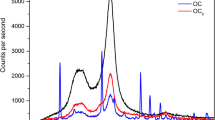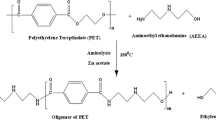Abstract
The purpose of this study was to explore ways to extend the chemical recycling of poly(ethylene terephthalate) (PET) as a valuable feedstock for chemical processes. First, PET wastes were depolymerised using a glycolysis method in the presence of sodium carbonate, which is considered to be a less environmentally damaging option for a catalyst. Good yields of the monomer bis(2-hydroxyethyl) terephthalate (BHET) were obtained (80 %). Second, to develop an economically viable recycling programme for the reclaimed BHET, the conversion of purified BHET into unsaturated polyester resins (UPR) was studied. The recovered monomer was thus polyesterified with maleic anhydride and subsequently mixed with styrene monomer to prepare UPRs. The resins were casted by a crosslinking reaction using methyl ethyl ketone peroxide and cobalt 2-ethylhexanoate as the initiator and catalyst, respectively. The polyesterification reaction was followed by gel permeation chromatography. The curing process was studied by differential scanning calorimetry and infrared spectroscopy. The cured resin was subjected to various characterisation methods in order to determine its chemical, physical and mechanical properties. Resins with suitable properties for commercial application were obtained.





Similar content being viewed by others
References
Suh DJ, Park OO, Yoon KH (2000) The properties of unsaturated polyester based on the glycolyzed poly(ethylene terephthalate) with various glycol compositions. Polymer 41:461–466
Mishra S, Goje AS (2003) Kinetics of glycolysis of poly(ethylene terephthalate). Waste powder at moderate pressure and temperature. J Appl Polym Sci 87:1569–1573
López-Fonseca R, Duque-Ingunza I, de Rivas B, Arnaiz S, Gutiérrez-Ortiz JI (2010) Chemical recycling of post-consumer PET wastes by glycolysis in the presence of metal salts. Polym Degrad Stabil 95:1022–1028
López-Fonseca R, Duque-Ingunza I, de Rivas B, Flores-Giraldo L, Gutiérrez-Ortiz JI (2011) Kinetics of catalytic glycolysis of PET wastes with sodium carbonate. Chem Eng J 168:312–320
Aslan S, Immirzi B, Laurienzo P, Malinconico M, Martuscelli E, Volpe MG, Pelino M, Savini L (1997) Unsaturated polyester resins from glycolysed waste polyethyleneterephthalate: synthesis and comparison of properties and performance. J Mater Sci 32:2329–2336
Nikles DE, Farahat MS (2005) New motivation for the depolymerization products derived from poly(ethylene terephthalate) (PET). Macromol Mater Eng 290:13–30
Zahedi AR, Rafizadeh M, Ghafarian SR (2009) Unsaturated polyester resin via chemical recycling of off-grade poly(ethylene terephthalate). Polym Int 58:1084–1091
Karayannidis GP, Nikolaidis AK, Sideridou ID, Bikiaris DN, Achilias DS (2006) Chemical recycling of PET by glycolysis: polymerization and characterization of the dimethacrylated glycolysate. Macromol Mater Eng 291:1338–1347
Shukla SR, Harad AM, Jawale LS (2008) Recycling of waste PET into useful textile auxiliaries. Waste Manage 28:51–56
Shukla SR, Harad AM, Jawale LS (2008) Chemical recycling of PET waste into hydrophobic textile dyestuffs. Polym Degrad Stabil 94:604–609
Tahvildari K, Mozafari Sh, Tarinsun N (2010) Chemical recycling of poly ethylene terephthalate to obtain unsaturated polyester resins. J Appl Chem Res 12:59–68
Limpiti T, Potiyaraj P (2009) Mechanical property improvement of UPE resin from glycolyzed PET with commercial UPE resin. JOM 19:45–51
Farahat MS, Abel-Azim AA, Abdel-Raowf ME (2000) Modified unsaturated polyester resins synthesized from poly(ethylene terephthalate) waste. 1. Synthesis and curing characteristics. Macromol Mater Eng 283:1–6
Puangsansuk K, Opaprakasit M, Udomkichdecha W, Potiyaraj P (2009) Effects of saturated acids on physical properties of UPE resins prepared from recycled PET products. J Polym Environ 17:65–70
Ghaemy M, Behzadi F (2002) Unsaturated polyester from glycolyzed PET recycled from post-consumer soft-drink bottles. Iran Polymer J 11:77–83
Marais S, Metayer M, Nguyen TQ, Labbe M, Saite JM (2000) Diffusion and permeation of water through unsaturated polyester resins-influence of resin curing. Eur Polym J 36:453–462
Delahaye N, Marais S, Saiter JM, Metayer M (1998) Characterization of unsaturated polyester resin cured with styrene. J Appl Polym Sci 67:695–703
Grenet J, Marais S, Legras MT, Chevalier P, Saiter JM (2000) DSC and TSDC study of unsaturated polyester resin. Influence of the promoter content. J Therm Anal Calorim 61:719–730
Ghaemy M, Mossaddegh K (2005) Depolymerisation of poly(ethylene terephthalate) fibre wastes using ethylene glycol. Polym Degrad Stabil 90:570–576
Ikladious NE (2000) Recycling of poly(ethylene terephthalate): identification of glycolysis products. J Elastom Plastics 32: 140–151
Chen CH, Chen CY, Lo YW, Mao CF, Liao WT (2001) Studies of glycolysis of poly(ethylene terephthalate) recycled from postconsumer soft-drink bottles. I. Influences of glycolysis conditions. J Appl Polym Sci 80:943–948
Goodman H (1998) Handbook of thermoset plastics. William Andrew Inc., Sydney, pp 97–120
Karayannidis GP, Achilias DS, Sideridou ID, Bikiaris DN (2005) Alkyd resins derived from glycolized waste poly(ethylene terephthalate). Eur Polym J 41:201–210
Ramis X, Salla JM (1995) Effect of the inhibitor on the curing of an unsaturated polyester resin. Polymer 36:3511–3521
Novák J (1998) Inhibitors of unsaturated polyesters and varnishes prepared from them. Prog Org Coat 16:231–253
Lu M, Kim S (2001) Unsaturated polyester resins based on recycled PET: preparation and curing behavior. J Appl Polym Sci 80:1052–1057
Matías MC, Larena A, De La Ulagares M, Martínez J (2011) Application of FTIR spectroscopy to the study of curing of glass reinforced polyester composites. Macromol Symp 94:273–282
Rahman MS, Al-Marhubi IM, Al-Mahrouqi A (2007) Measurement of glass transition temperature by mechanical (DMTA), thermal (DSC and MDSC), water diffusion and density methods: a comparison study. Chem Phys Lett 440:372–377
Sanchez EMS, Zavaglia CAC, Felisberti MI (2000) Unsaturated polyester resins: influence of the styrene concentration on the miscibility and mechanical properties. Polymer 41:765–769
Acknowledgments
The financial support for this work, provided by the Spanish Ministerio de Ciencia e Innovación (CTQ2008-06868-C02) and Gobierno Vasco (SPE12UN023), is gratefully acknowledged. The supply of post-consumer waste samples of PET by ECOEMBES is also acknowledged. The authors wish to thank Dr. J.M. Laza and Dr. J.L. Vilas for their kind contribution to the process of DMTA characterisation.
Author information
Authors and Affiliations
Corresponding author
Rights and permissions
About this article
Cite this article
Duque-Ingunza, I., López-Fonseca, R., de Rivas, B. et al. Synthesis of unsaturated polyester resin from glycolysed postconsumer PET wastes. J Mater Cycles Waste Manag 15, 256–263 (2013). https://doi.org/10.1007/s10163-013-0117-x
Received:
Accepted:
Published:
Issue Date:
DOI: https://doi.org/10.1007/s10163-013-0117-x




